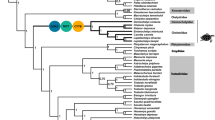Abstract.
The molecular slow-down hypothesis suggests a temperature-controlled slow-down of molecular substitution rates to be a common characteristic of polar poikilotherm organisms. There is evidence that metabolic rate may be controlling the rate of nucleotide substitution in many organisms. In this study, absolute rates of nucleotide change based on a geologically calibrated molecular clock from the 16S ribosomal RNA (LSU) gene of 12 species of serolid isopods living in Antarctic waters are calculated and compared with data from sesarmid crabs from tropical latitudes. Contrary to the prediction, no difference of molecular substitution rates between Crustacea from different latitudes can be detected. This result is corroborated by testing the relative rate in serolid isopods against other Crustacea from tropical, temperate and Antarctic waters. While an influence of temperature on the rate of spontaneous mutation cannot be dismissed, the results show that temperature is not the key determinant of the rate of nucleotide change as has been suggested by the molecular slow-down hypothesis.
Similar content being viewed by others
Author information
Authors and Affiliations
Additional information
Electronic Publication
Rights and permissions
About this article
Cite this article
Held, C. No evidence for slow-down of molecular substitution rates at subzero temperatures in Antarctic serolid isopods (Crustacea, Isopoda, Serolidae). Polar Biol 24, 497–501 (2001). https://doi.org/10.1007/s003000100245
Accepted:
Issue Date:
DOI: https://doi.org/10.1007/s003000100245




